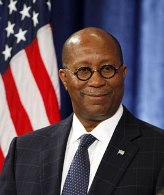 | « Back to article | Print this article |
 Noting that Obama Administration is fundamentally committed to developmental premise of Doha Round, US Trade Representative Ron Kirk has said that advanced developing countries like China and India need to come in the same spirit as the United States for its success.
Noting that Obama Administration is fundamentally committed to developmental premise of Doha Round, US Trade Representative Ron Kirk has said that advanced developing countries like China and India need to come in the same spirit as the United States for its success.
"US President (Barack) Obama, perhaps, more than any president we have had in recent times, is fundamentally committed to the developmental premise of Doha."
As difficult of a challenge as we have had with this economic tsunami here in the US, you just can't imagine the impact this has had on the poorest countries in the world, Kirk said.
"So we take very seriously the President's challenge to us to work collaboratively with our partners to try to meet the imperative, at least the stretch goal from our leaders at the G-20 summit, to bring the Doha Agreement to a close," he said.
Now, if all of our partners are willing to sit down, engage with us, and particularly open their minds to negotiating across not only agriculture but in NAMA and in services and on rules and are willing to make the hard choices necessary to produce a balanced outcome, I think we can meet that goal, Kirk said.
"I'm proud of the work that we have engaged in as shorthanded as we've been - to change the negotiating paradigm in Geneva. But we especially need these advanced developing economies, such as Brazil, China, India, South Africa, to come to the table in the same spirit," Kirk noted.
The US Trade Representative agreed with a recent Australian statement that all products in all sectors are on the table. "Australia and Canada and the EU have been very helpful, very open, but Australia in particular, and their trade minister Simon Crean has been very helpful in helping us to convince our colleagues, our partners within the WTO that we have nothing to fear by putting everything on the table," he said.
The Doha Round was never intended to be only about agriculture, but for whatever reason, we seem to have stalled there and have been afraid to engage in services, in manufacturing, in these other areas, he said.
"We believe engaging not only horizontally, across all sectors, but supplementing that with these sustained bilateral talks between the developed and advanced developing economies is the only way to get us across the finish line," Kirk said.
Conceding that there is "certainly a possibility" that the US could be blamed for a failure of the Doha Round; Kirk said: "But rather than operating from that paradigm of blame avoidance, the President has told us this is important. If we get this right, this is a huge shot in the arm to the world's economy.
As important as doing bilateral agreements are, which we won't give up on, to get an agreement among 153 economies and have a major trade liberalising impetus could help every economy in the world, but we have to get it done right.
He said: "So we think it's worth staying at the table, and we'd rather focus on moving us to a position that we're in a stronger, more productive environment rather than worrying about who to blame if it doesn't pass.
Referring to the last year's Copenhagen summit, Kirk said it is hard to bring 153 of the most diverse economies in the world to a consensus when there are the poorest economies in the world to some of the most advanced. "So I don't believe we should give up.
A lot of good work has been done, but we shouldn't be afraid of honestly confronting some of the gaps that exist," he said. There are loopholes in terms of the use of special safeguards and safe mechanisms that make it impossible for some economies to determine what the market opportunities are.
And so, anyway, rather than focusing on, you know, a failure phenomenon, we believe it's just more important to honestly confront the gaps and see what we can do to work collectively to close those, Kirk said.